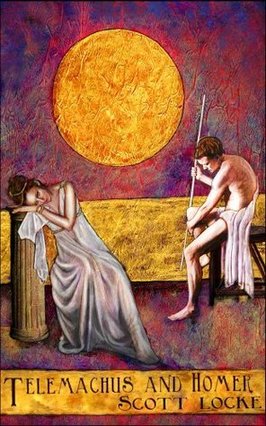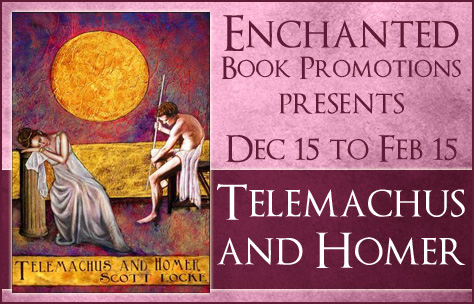
Title: Telemachus and Homer
Author: Scott Locke
Genre: YA Fantasy
For every boy who grew up in his father’s shadow and every girl who has been underestimated, there comes a time to look within themselves to see if they have the strength to meet the challenges of the lives. For Telemachus this time arrives soon after Odysseus returns from his twenty year absence, when Telemachus comes to appreciate that his own life needs to be about more than waiting for his father to guide him. On the verge of embarking on an adventure, he learns that his community has been threatened and realizes that he does not know how to help. Swallowing his pride, he recognizes that Homer, a young blind woman is a necessary ally. Homer, like Telemachus has something to prove, for although she is respected for her knowledge, she feels unfairly defined by her community. Together, as the people of Ithaca’s last hope, they begin their quest.
About the Author:
Scott Locke is a graduate of Brown University with a concentration in biology and of the University of Pennsylvania School of Law, where he earned his J.D. Scott has published many articles on various aspects of intellectual property. Telemachus and Homer is Scott’s first publication of fiction.
Links:
Buy the Book: http://www.amazon.com/Telemachus-Homer-Scott-Locke-ebook/dp/B0089XB3WY/ref=sr_1_1?ie=UTF8&qid=1416846087&sr=8-1&keywords=Telemachus+and+homer
http://indiereader.com/2014/09/telemachus-homer/
https://www.facebook.com/MANDEMik/posts/200246670102582
http://www.goodreads.com/author/show/7990125.Scott_Locke
http://www.mythforum.com/threads/telemachus-and-homer.1395/
http://blog.dreamtheanswer.com/tag/telemachus-and-homer/
http://blog.dreamtheanswer.com/2014/04/underestimated-and-living-in-a-shadow/
Review:
After the Trojan War Telemachus waits everyday for the return of his father, Odysseus. Telemachus spends two decades of his childhood waiting, slowly growing into a man who only wishes that his father was there while he was growing up. Homer was born blind, but she has not wasted any of her childhood with idleness. She has soaked up any knowledge useful to her and has become proficient in math, science, history, geography and medicine. Homer has befriended Telemachus as he keeps vigil for his father at the coast. Telemachus acts as Homer's eyes, telling her of the sights around her. Meanwhile, Homer has picked up on Telemachus' moods and the root of his pain. Also befriending Telemachus are a chrompath and a timekeeper, two mythical creatures. When Odysseus returns home a hero to the town of Ithaca, Telemachus finds out that the father that has been absent for twenty years is not what he expected. The Trojan people have also not forgotten Odysseus and the horse that destroyed their people. The Trojans enact revenge on Odysseus that sends Telemachus and Homer on a adventure of their own.
Based on Greek mythology, Telemachus and Homer features action, adventure and fantasy. I was most impressed by the characters and the relationships that they found with one another. Although Homer is blind, she is fiercely independent, logic driven and the voice of reason. Homer has the ability to find the best course of action and to believe in Telemachus. Telemachus lacks confidence and believes that he lacks strength, with Homer's guidance and belief in their friendship, Telemachus is able to become as much of a hero as his father. I also had a soft spot for the mythical creatures, Amaryllis the chrompath, a winged creature with a hippopotamus face with the ability to heal and Manos, a grumpy Timekeeper with the body of a hairy turtle. Together they added a fantasy feeling as well as some comic relief. The adventure aspect of the story is also well done, sending Telemachus on a quest to save his father that he was about to run away from. The settings were also interesting, Hera's garden and Troy after the war were vividly described and I was able to picture them. A few minor things bothered me with this story, but not enough to ruin it; there were several small editing errors in my copy as well as the fact that it was told from a third person point of view, as many myths are, not allowing me to fully grasp the characters motivations.
This book was received for free in return for an honest review.
When he arrived at the house, it was empty. This was no surprise, because everyone was
at the party. Before he began to pack, Telemachus surveyed the house, just as he did the path leading up to it. He slowly walked up and down the halls, which were decorated with paintings and sculptures that depicted his father’s rugged features, chiseled muscles, broad shoulders, and angular face. As he had done so many times in the past, after seeing the dozens of tributes to his father, Telemachus looked at his own reflection in the back of a shield and in a still pool of water. He paused and felt his biceps, as if wishing to make them grow. But after a few moments, he again accepted his small stature, his soft features, and his thin body. In his mother, these features were a source of beauty, but in a young man, like Telemachus, they were a source of insecurity.
Telemachus then methodically packed two bows, thirty-six arrows, two swords, two daggers, a shield, a helmet, his paint box, twelve canvases, his journal, and rations that in addition to any fish that he could catch would hold for two months. If he could not establish himself somewhere and be self-sufficient in that time, then he would return to the world where he was be merely an extension of his father.
When everything was loaded in his wheelbarrow, he sat down to write a note to his parents.
Dear Mom and Dad,
By the time that you read this note, I will be gone. Ithaca holds very little for me, and it is my time to explore the world. I have taken my ship. I am not sure where I will go, but I know that a journey is in my destiny.
I would have told you in person, but I know that you would have tried to stop me. I love you and will send word when I arrive at my destination.
Always your son, Telemachus
He sealed the letter with his family crest and affixed it to the door.








 RSS Feed
RSS Feed



